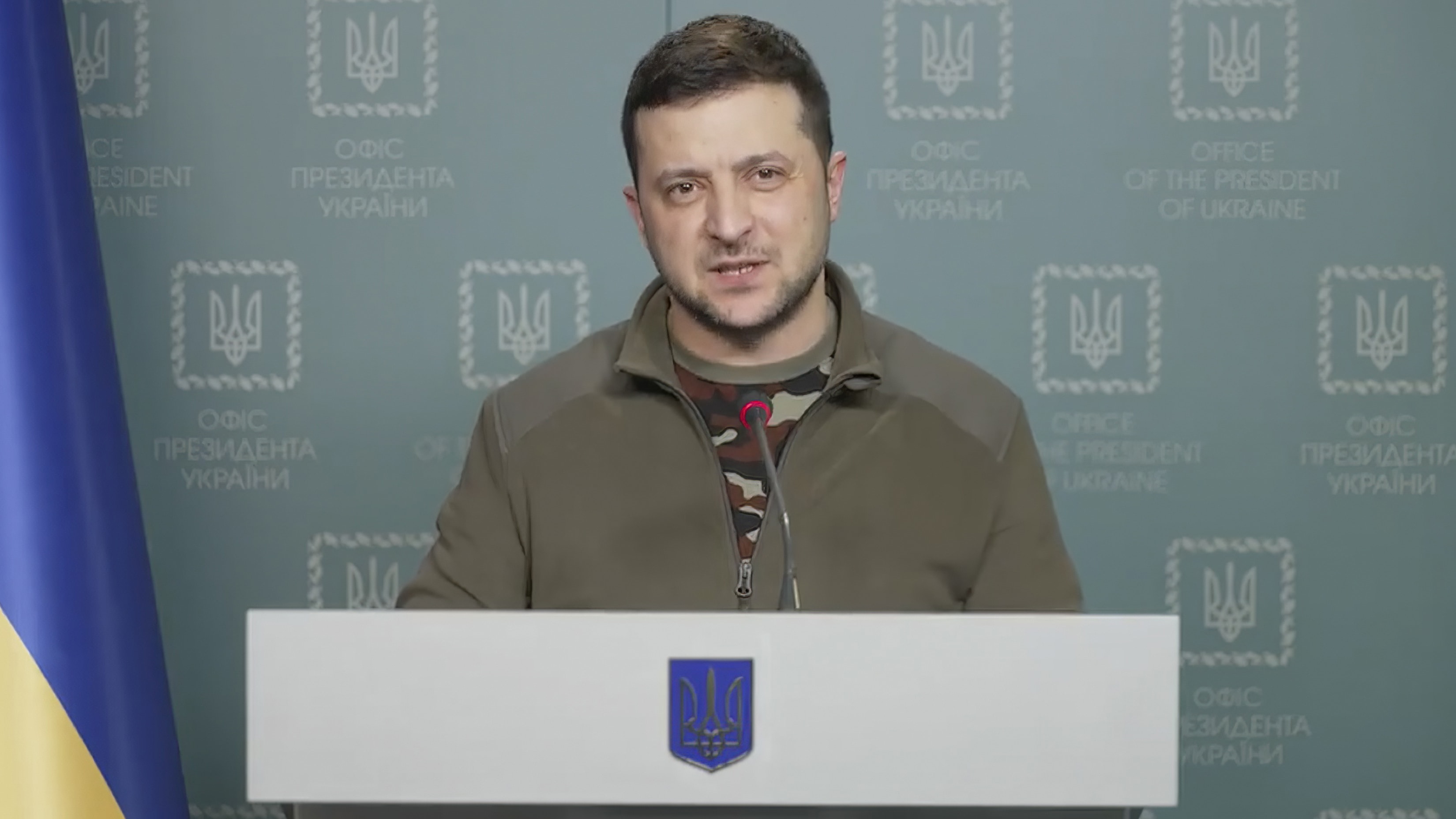Zelensky seen in Kyiv office for 1st time since Russian invasion began: 'I'm not hiding'


A free daily email with the biggest news stories of the day – and the best features from TheWeek.com
You are now subscribed
Your newsletter sign-up was successful
Ukrainian President Volodymyr Zelensky released a new video on Monday night, speaking from behind his desk at the presidential palace in Kyiv.
This is the first time Zelensky has been spotted in his office since the Russian invasion of Ukraine started on Feb. 24, CNN reports. "I'm not hiding," Zelensky said in his nine-minute address. "And I'm not afraid of anyone."
Every single Ukrainian person is "at war" with Russia, Zelensky said. "We all contribute to our victory, which will definitely be achieved. By force of arms and our army. By force of words and our diplomacy. By force of spirit, which the first, the second, and each of us have."
The Week
Escape your echo chamber. Get the facts behind the news, plus analysis from multiple perspectives.

Sign up for The Week's Free Newsletters
From our morning news briefing to a weekly Good News Newsletter, get the best of The Week delivered directly to your inbox.
From our morning news briefing to a weekly Good News Newsletter, get the best of The Week delivered directly to your inbox.
In several parts of Ukraine, including Melitopol, Kherson, and Starobilsk, ordinary citizens are defending themselves, "although they do not have weapons there," Zelensky said. What they do have, he continued, is "courage. Dignity. And hence the ability to go out and say, 'I'm here, it's mine, and I won't give it away. My city. My community. My Ukraine.'"
Russian forces "forget that we are not afraid of paddy wagons and batons," Zelensky said. "We are not afraid of tanks and machine guns. When the main thing is on our side, truth. As it is now." Russia troops are destroying residential buildings, factories, and churches, he added, and the "hatred that the enemy brought to our cities with shelling and bombing will not remain there." Zelensky vowed to "rebuild everything. We will make our cities destroyed by the invader better than any city in Russia."
Ukrainian negotiators met with their Russian counterparts in Belarus on Monday for a third round of talks, and while Zelensky would "like to say the third and final," he and his team are "realists. So we will talk. We will insist on negotiations until we find a way to tell our people, 'This is how we will come to peace.' Exactly to peace. We must realize that every day of struggle, every day of resistance creates better conditions for us. Strong position to guarantee our future. In peace. After this war."
A free daily email with the biggest news stories of the day – and the best features from TheWeek.com
Catherine Garcia has worked as a senior writer at The Week since 2014. Her writing and reporting have appeared in Entertainment Weekly, The New York Times, Wirecutter, NBC News and "The Book of Jezebel," among others. She's a graduate of the University of Redlands and the Columbia University Graduate School of Journalism.
-
 What are the best investments for beginners?
What are the best investments for beginners?The Explainer Stocks and ETFs and bonds, oh my
-
 What to know before filing your own taxes for the first time
What to know before filing your own taxes for the first timethe explainer Tackle this financial milestone with confidence
-
 The biggest box office flops of the 21st century
The biggest box office flops of the 21st centuryin depth Unnecessary remakes and turgid, expensive CGI-fests highlight this list of these most notorious box-office losers
-
 What would a UK deployment to Ukraine look like?
What would a UK deployment to Ukraine look like?Today's Big Question Security agreement commits British and French forces in event of ceasefire
-
 Would Europe defend Greenland from US aggression?
Would Europe defend Greenland from US aggression?Today’s Big Question ‘Mildness’ of EU pushback against Trump provocation ‘illustrates the bind Europe finds itself in’
-
 Is conscription the answer to Europe’s security woes?
Is conscription the answer to Europe’s security woes?Today's Big Question How best to boost troop numbers to deal with Russian threat is ‘prompting fierce and soul-searching debates’
-
 Trump peace deal: an offer Zelenskyy can’t refuse?
Trump peace deal: an offer Zelenskyy can’t refuse?Today’s Big Question ‘Unpalatable’ US plan may strengthen embattled Ukrainian president at home
-
 The Baltic ‘bog belt’ plan to protect Europe from Russia
The Baltic ‘bog belt’ plan to protect Europe from RussiaUnder the Radar Reviving lost wetland on Nato’s eastern flank would fuse ‘two European priorities that increasingly compete for attention and funding: defence and climate’
-
 How should Nato respond to Putin’s incursions?
How should Nato respond to Putin’s incursions?Today’s big question Russia has breached Nato airspace regularly this month, and nations are primed to respond
-
 What will bring Vladimir Putin to the negotiating table?
What will bring Vladimir Putin to the negotiating table?Today’s Big Question With diplomatic efforts stalling, the US and EU turn again to sanctions as Russian drone strikes on Poland risk dramatically escalating conflict
-
 The mission to demine Ukraine
The mission to demine UkraineThe Explainer An estimated quarter of the nation – an area the size of England – is contaminated with landmines and unexploded shells from the war
